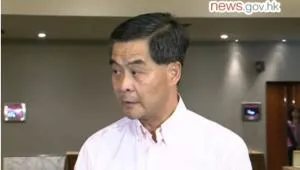
4 big things you need to know about CE Leung's Policy Address
Poverty, housing amongst key themes.
According to DBS, Chief Executive Leung Chun-ying delivered his second Policy Address yesterday. This year, the focus has shifted from increasing land supply to addressing the needs of the poor and the younger generation.
This is expected as the government increasingly focuses on tackling socio-demographic issues such as the aging population, labor/talent shortages and the working poor.
DBS draw 4 themes from the recent policy address.
Here's more:
- The newly-introduced “Low-income Working Family Allowance” is probably the most practical measure and one that benefits the largest number of people (more than 200 000 low- income families). Annual expenditures are estimated to be around HK$3 billion.
Such an allowance kills two birds with one stone – it alleviates poverty and encourages people to continue working – all the more important as Hong Kong’s labor force will shrink soon as baby boomers retire. Meanwhile, further subsidies in the areas of vocational and university education could help Hong Kong nurture and retain youth talent.
- On the issue of an aging population, the government will double the annual voucher amount on the Elderly Health Care Voucher Pilot Scheme and subsidize colon cancer screening for high risk groups.
While such measures seem piece-meal and short term, we are hopeful the government will announce longer term measures to deal with the aging population problem in the upcoming Budget.
In particular, we anticipate at least some guidance on how to finance future medical expenses, possibly in the form of a fund in which the government puts aside a proportion of the annual budget surplus to “save for the rainy day”.
- Turning to housing, increasing land supply remains high on the government’s agenda despite shorter coverage in yesterday’s Policy Address.
It’s just that the bulk of specific long-term measures have already been mentioned last year and there is no need to repeat them again. The bottom line is that the Chief Executive has affirmed plans to ensure a total of 470,000 units are supplied in the coming ten years, with public housing accounting for 60%.
- As for economic policies, the government will continue to promote the development of our financial services industry through the Financial Services Development Council, which was first introduced in last year’s Address. However, the actual speed and scope of development in Hong Kong will largely hinge on the mainland’s financial development.
Meanwhile, the government’s decision to further develop Lantau Island is encouraging. If successful, it will instill vibrancy in the tourism sector, provide Hong Kong with a metropolis which hosts new office space (direly needed), hotels, employment opportunities and housing development projects.
To conclude, while this Policy Address seems fairly balanced, a full assessment of the government’s plans for Hong Kong can only be made after the 2014-2015 Budget is announced next month. Hopefully, it will offer concrete solutions on the pressing issue of population aging.








![Cross Domain [Manu + SBR + ABF + ABR + FMCG + HBR + ]](https://cmg-qa.s3.ap-southeast-1.amazonaws.com/s3fs-public/styles/exclusive_featured_article/public/2025-01/earth-3537401_1920_4.jpg.webp?itok=WaRpTJwE)









 Advertise
Advertise


